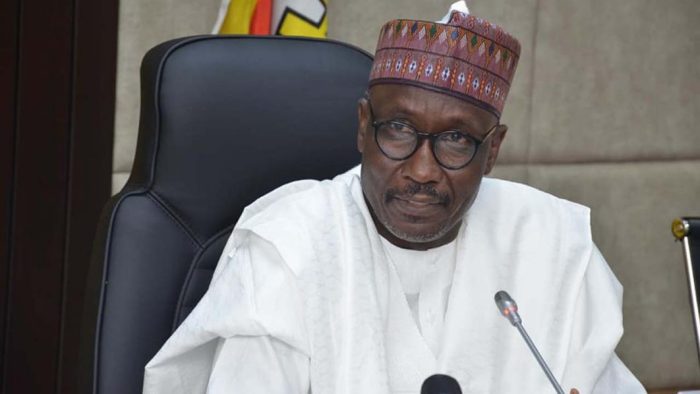The imbroglio surrounding the purported suspension of Prof. Usman Yusuf, the Executive Secretary of the National Health Insurance Scheme (NHIS), has generated different shades of controversy within and outside the agency. There is hardline obstinacy by the parties to the matter, with the governing board of the NHIS insisting on its power to suspend Yusuf, while Yusuf maintains that he is only answerable to the president.
In the background of the clash between Yusuf and the board of the NHIS are the Health Maintenance Organisations (HMOs) and some staff of the NHIS who want Yusuf gone. Since Yusuf was appointed by the Buhari administration in July 2016, there has been palpable crisis within the NHIS, as it became apparent that it would not be business as usual. Yusuf has personally alleged wide scale corruption at the NHIS, touching on the HMOs, during the years preceding his appointment and he promised to return administrative and financial integrity to the healthcare insurance in Nigeria.
Yusuf however landed in a pot of his own controversy when NHIS top officials accused him of fraud and mismanagement, including corruption in the handling of about 919 million naira without due process, and other matters. The Minister of Health, Prof Isaac Adewole, ordered his suspension in June 2017, to clear way for proper investigation of the allegations. However, President Buhari lifted the suspension in February 2018, and this, after rumours of tension between Yusuf and the Minister of Health had seeped into public knowledge.
The board of the NHIS announced its decision to suspend Yusuf again on October 18, 2018, and some of the staff of the NHIS, especially at the Abuja Headquarters, openly jubilated the decision and even went further to form themselves into a barricade to prevent Yusuf from gaining access to his office. Yusuf sought the protection of policemen to enter the premises, in protest of the board decision and in defiance of the revolting staff members – a step that has generated separate controversy. The question now is whether Yusuf is a reformer and crusader for positive change or a new player in the field of public corruption that does not play well with others.
The experience of civil service in Nigeria generally does not cast the revolting staff members of the NHIS in a positive light. They want Nigerians to believe that whatever steps have been taken by them and the board has been in the interest of Nigerians. Interestingly, the HMOs who threatened to challenge, in court, the decision of the president to reinstate the suspended Yusuf earlier in the year, also claimed to be working in the interest of Nigerians.
Usually, in the civil service, when people bandy together in this manner, it is in protection of their own interests, which, like our politicians, is paramount. In the different claims levied against Yusuf, he is said to be “insubordinate” and to have run the NHIS with an “iron hand” since he took office. In Nigeria, this could be an euphemism for blocking avenues for cash leakage or administrative profiteering. The involvement of the HMOs and their campaign against Yusuf also deepens suspicion of the motivations behind the move against him, especially as Yusuf has not been shy about his criticism of the HMOs or their relevance in the healthcare sector.
There is data to show that the HMOs have underachieved in all the years the NHIS has engaged them, as they are the recipients of billions of naira from the government which ought to be transmitted to health service providers. It was revealed in hearings before the House of Representatives that the HMOs have only used a fraction of these funds in the manner stipulated, for varying reasons, while the huge excess was not being remitted back to the NHIS.
In the Nigerian civil service that has been the principal enabler of corruption in public office, racketeering is rife and mafias are often found around major destinations of government funds, for which the NHIS is an example. Neither the staff of the NHIS, who are revolting, nor the HMOs have addressed the ghost enrollees of the scheme that have been uncovered and blocked in Yusuf’s time at the helm. Instead, it seems like a campaign of calumny is being orchestrated against Yusuf for daring to shake the NHIS/HMO table of corruption. One suspects that this is why the presidency, and the House of Representatives at a point, have backed Yusuf’s reinstatement.
In any case, it is not for the staff of the NHIS to handle their dissatisfaction in the manner they did on Monday, October 21, 2018. There are processes to be followed for every act in government. The staff of NHIS have no power to suspend or restrict the movement of the Executive Secretary. Already, there is open controversy as to whether or not the board of the NHIS has this power, as leading legal minds have agreed that the NHIS Act does not expressly confer this power on the board. It would have been sensible for the aggrieved staff to urge the board to seek legal determination rather than subject themselves to suspicion by their overt act that led Yusuf to seek police protection.
In alleging lack of due process in Yusuf’s management of finance and affairs of the NHIS, one expects that the board would be mindful of following due process in taking any action. Where the process is unclear, and especially when their action is being contested as in this case, it is expected that the board will seek legal advice and redress. Whether backed by the board or not, the physical attempt to restrain Yusuf introduces an element of bias and probable selfish interest and malice into what ought to be a public interest matter.
Nigerians should not be bamboozled every time someone comes up with stories involving huge sums of money to accuse a government official of corruption, especially when the claim is arising from an organized group of civil servants. Like our politicians, we should not readily take the word of civil servants who have been the greatest collaborators in the history of corruption in Nigeria.
No part of this opinion is exonerating Yusuf from possible culpability or guilt in any of the accusations made against him. This is a common sense take on the reaction of Nigerian civil servants to a change in leadership which apparently has not been favourable to them, for whatever reasons. One ought to apply caution in a case like this. The EFCC is in possession of a petition against Yusuf, and all pressure ought to be exerted on this agency and the courts to obtain any outcome, not through public campaigns of calumny, blame trading and deflections that have been seen in this case. It does not speak well of our public service or of the understanding of due process that the board and aggrieved staff of the NHIS suggest they have.
Whether Yusuf is culpable or not, members of the NHIS board, the HMOs and some of the revolting staff of the NHIS may have dirty hands that would be better protected if Yusuf is disgraced out of office as Executive Secretary. Where allegations are made in a matter involving the civil service, the smart thing is never to assume that there are any saints.
The interest of Nigerians is not best served by a board somewhere or a group of civil servants getting their way, it is best served when the processes of government are carried out as prescribed by law. Where the law is sketchy, the law courts should be consulted. Anything outside of this is against the interest of Nigerians, especially when a few people stand to gain more from an outcome. In the end, better management of this issue is a matter of public interest.
For comments, send SMS (only) to 08058354382



